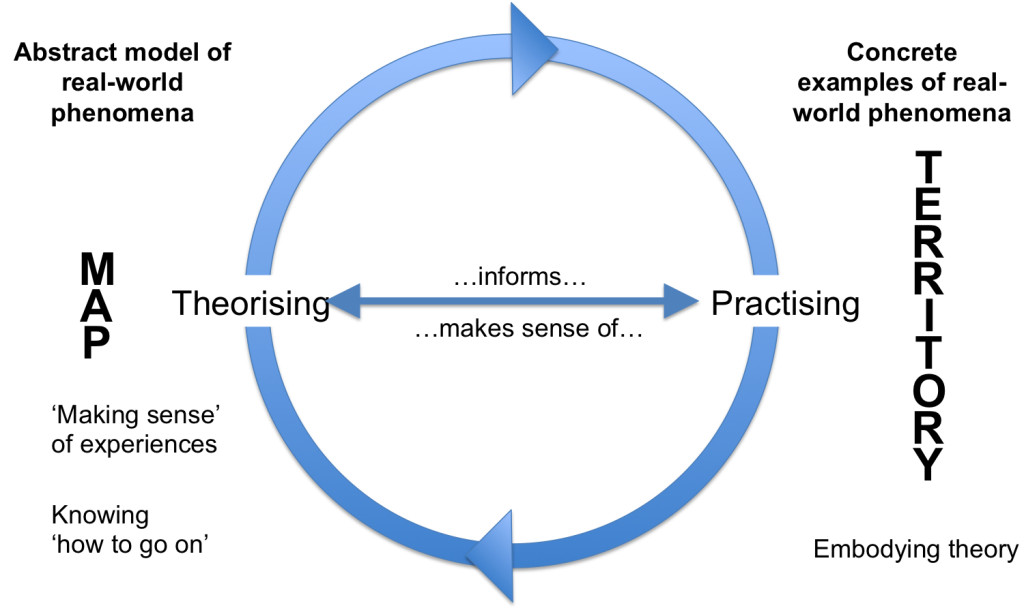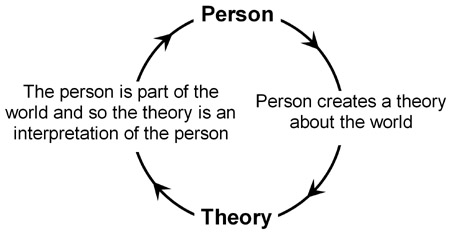-
 stakhanov
3I'd like to share my thougts nd know yours on belief but not on what belief is but rather on what are the consequences of belief.
stakhanov
3I'd like to share my thougts nd know yours on belief but not on what belief is but rather on what are the consequences of belief.
I personally think that belief give to people like a reason to live and a real trust in what they do u know, even if the belief is not the truth, that's not the point, but there are a lots of examples on people who made/achieved awesome things because their belief pushed them into a succesfull mindset like they are more able to achieve what they aim. whatever it is, look at what people did on the 21 december 2012 or on highly religious people who made billions.
what do u think bout that ? -
 Srap Tasmaner
5.2k
Srap Tasmaner
5.2k
Suppose I'm looking for my keys in the kitchen. If asked why I'm doing that, I might say that I think I left them there. Someone else asked why I'm doing what I'm doing might say I believe my keys are in the kitchen. In each case, some belief is attributed to me as at least part of an explanation of my behavior.
The twin problems that arise are that (1) some other beliefs might also work as part of an explanation of my behavior, substituting for the belief previously offered; and (2) I might have that belief and yet not engage in the observed behavior.
Is that where we are? -
 Janus
18k
Janus
18k
I think this is right: acting on a belief is a way of expressing it. So in order to qualify as a belief it must be able to be either described, depicted or explained or else acted upon, at least in principle. -
 Srap Tasmaner
5.2kHere's a different version.
Srap Tasmaner
5.2kHere's a different version.
Suppose I want to have my keys. Then we might say
(A) Given that Pat wants his keys, if he believes they are in the kitchen, then ceteris paribus he will look for them in the kitchen.
Now (A) can fail if, say, there's a knife-wielding madman in my kitchen. It could also fail if I just happen to find them in the living room on my way to the kitchen. It can fail in lots of ways.
We could say (A) is like any other prediction, that it's really a claim that the consequent is probable, and it can be defeated by unlikely occurrences. But we might prefer something more like this:
(B) Given that Pat wants his keys, if he believes they are in the kitchen, and if he is rational, then ceteris paribus he will look for them in the kitchen.
That's still a prediction, and still probable. So maybe we need this:
(C) Given that Pat wants his keys, if he believes they are in the kitchen, and if he is rational, then he will wish to look for them in the kitchen.
And that can be true whether it's safe for me to enter the kitchen, and right up until the point that I find my keys elsewhere.
That only gives us an expected connection between a belief and an intended behavior, rather than an actual behavior, and lots of shadows can fall between the intention and the act. Does that bother us?
ADDENDUM
Beliefs here are how we get from one preference to another. How we get from preference to action is left for another day. -
 Banno
30.6k1. Why is a document written in my chicken scratch that is truly only decipherable by me "public," if It only conveys information to me and it helps me recollect prior events?, and
Banno
30.6k1. Why is a document written in my chicken scratch that is truly only decipherable by me "public," if It only conveys information to me and it helps me recollect prior events?, and
2. Why is having George available helpful in me recollecting past theories I've held if I have a better memory than him? — Hanover
Same answer. Putting it in writing or saying it out loud both bring it out in the open. -
 Srap Tasmaner
5.2k
Srap Tasmaner
5.2k
I still feel pretty good about the preference version, because I get to say "If you don't want to look for your keys in the kitchen, either you don't think they're there or you don't want to find them (or you don't reason like the rest of us)." That feels solid to me. -
 Banno
30.6kStrewth, that was quick.
Banno
30.6kStrewth, that was quick.
Have you come across the book The Elephant in the Brain?
See https://80000hours.org/podcast/episodes/robin-hanson-on-lying-to-ourselves/
I was about to start a thread on it, but I might leave that for now. -
 Banno
30.6kHanson argues that our justifications serve to align what we do with the norms of our culture.
Banno
30.6kHanson argues that our justifications serve to align what we do with the norms of our culture.
Given that Pat wants his keys, if he believes they are in the kitchen, and if he is rational, then ceteris paribus he will look for them in the kitchen. — Srap Tasmaner
So in effect the reason Pat looks in the kitchen is not that he believes the keys are there but that he wishes to appear rational. -
 Srap Tasmaner
5.2kIt's rather that Pat searches the kitchen, and justifies his behaviour post-hoc by claiming to believe that the keys are there.
Srap Tasmaner
5.2kIt's rather that Pat searches the kitchen, and justifies his behaviour post-hoc by claiming to believe that the keys are there.
The belief is irrelevant. Pat does what Pat does. — Banno
But that can't be right, because of the knife-wielding psycho in the kitchen. I can form a preference to look there even if it's overridden by my preference to go on breathing. Rationality does seem to have a foothold here: given some preferences and beliefs, you should also have this preference. Maybe you don't act on it for whatever reason, or for no reason. Different issue.
All of that assumes by "behavior" you mean outward, publicly observable actions. Are you throwing in what I think as behavior? -
 Banno
30.6kAll of that assumes by "behavior" you mean outward, publicly observable actions. Are you throwing in what I think as behavior? — Srap Tasmaner
Banno
30.6kAll of that assumes by "behavior" you mean outward, publicly observable actions. Are you throwing in what I think as behavior? — Srap Tasmaner
What else would it be? -
 Srap Tasmaner
5.2k
Srap Tasmaner
5.2k
There's surely a difference of some kind. We can say there's A's and there's B's, or we can say there's two kinds of A's. I don't suppose it matters unless we want to say "All A's are F"; then we'd want to be sure we don't mean "All type 1 A's are F."
In recent posts here, I've been kicking the can of outward behavior into another zip code. -
 Banno
30.6kThe notion I am playing with is that we get the order of the explanation wrong.
Banno
30.6kThe notion I am playing with is that we get the order of the explanation wrong.
It's not:
Pat believes the keys are in the Kitchen
So, all things being equal, Pat will search in the kitchen
but
Pat searched in the kitchen
Therefore Pat says he believes the keys are in the kitchen -
 Sam26
3.2kWhat else would it be? — Banno
Sam26
3.2kWhat else would it be? — Banno
Yes, we learn what a belief is by what we observe, what we speak, and what is written. There are many observable actions that we correlate with beliefs. We learn the use of the word belief just as we learn the word pain. The outward signs show us what a belief is, just as the outward signs of pain, show us what pain is. The meaning of the words having nothing to do with anything inner, but with the outward sign of the inner process. We learn to associate a moan, a cry, a scream with pain, we use the word in conjunction with others, i.e., as a rule-based linguistic process. We are able to look at an animal and see that it too can show certain behaviors that show signs of pain, not unlike ours. However, the animal can only show us so much. As Wittgenstein pointed out, "A dog believes his master is at the door. But can he also believe his master will come the day after tomorrow?" Some things can only be shown if one has mastered the use of a language. -
 frank
19kHence triangulation - me, you, the world. — Banno
frank
19kHence triangulation - me, you, the world. — Banno
Culture and nature provide the forms of background practices from which we derive propositions (upon reflection.) Our reflections in turn affect future experiences.
If you're wanting you, me, and the world to stand as independent entities, you're going to become stuck in a Cartesian mudpit.
Welcome to The Philosophy Forum!
Get involved in philosophical discussions about knowledge, truth, language, consciousness, science, politics, religion, logic and mathematics, art, history, and lots more. No ads, no clutter, and very little agreement — just fascinating conversations.
Categories
- Guest category
- Phil. Writing Challenge - June 2025
- The Lounge
- General Philosophy
- Metaphysics & Epistemology
- Philosophy of Mind
- Ethics
- Political Philosophy
- Philosophy of Art
- Logic & Philosophy of Mathematics
- Philosophy of Religion
- Philosophy of Science
- Philosophy of Language
- Interesting Stuff
- Politics and Current Affairs
- Humanities and Social Sciences
- Science and Technology
- Non-English Discussion
- German Discussion
- Spanish Discussion
- Learning Centre
- Resources
- Books and Papers
- Reading groups
- Questions
- Guest Speakers
- David Pearce
- Massimo Pigliucci
- Debates
- Debate Proposals
- Debate Discussion
- Feedback
- Article submissions
- About TPF
- Help
More Discussions
- Does belief in the material world secure belief in God?
- Belief (not just religious belief) ought to be abolished!
- Is belief in LFW and lack of empathy correlated?
- The conception of the wealthy "taking from the impoverished" is a ludicrous belief
- ~Bp <=> B~p (disbelief in something is the belief of the absence of that thing).
- Other sites we like
- Social media
- Terms of Service
- Sign In
- Created with PlushForums
- © 2026 The Philosophy Forum







 .
. 